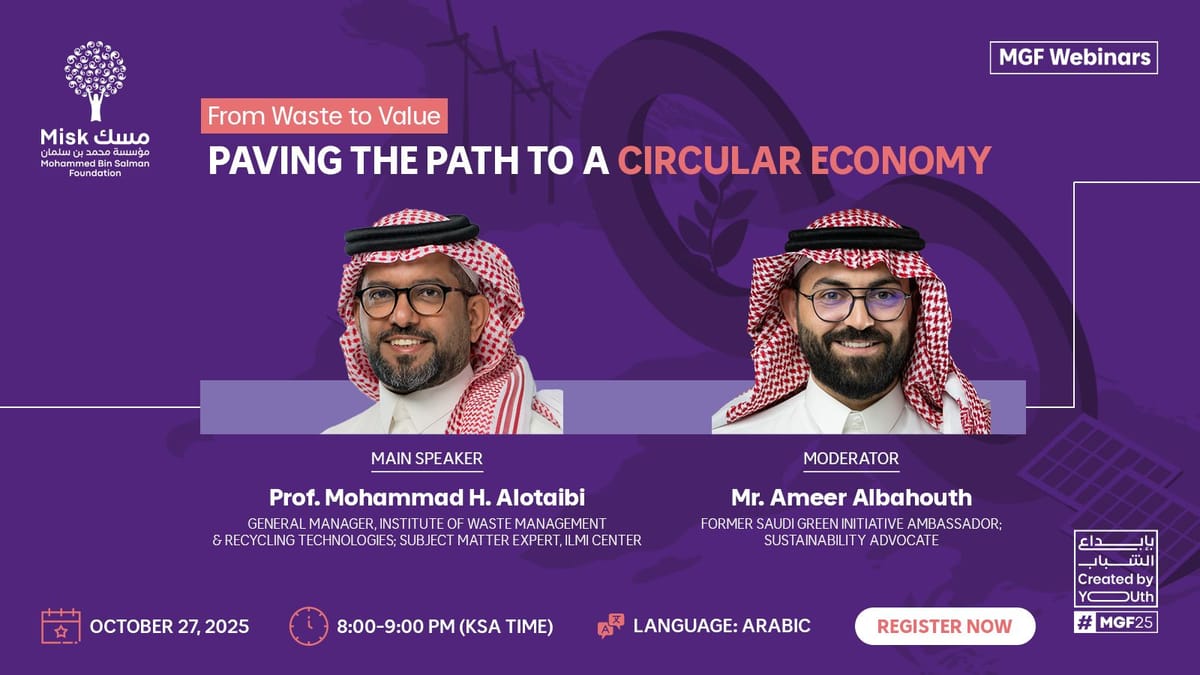
Why I can not wait to host this Arabic webinar with Dr. Mohammed AlOtaibi.
I’ve always believed that the most powerful ideas are the ones that change how we see the world. “Waste” is one of those ideas. For years, we treated it as a cost center, something to hide, haul, or burn. But what if we looked at it differently? What if waste could fuel the future, literally and economically?
That’s the conversation I’m thrilled to lead with Dr. Mohammed Al-Otaibi in an Arabic webinar on 27 October at 8:00 PM. In just 60 minutes, we’ll unpack how science and innovation are turning what we throw away into energy, materials, jobs, and a real competitive advantage for businesses in Saudi Arabia and beyond. And yes, the conversation will be in Arabic.
Why this session matters now
Saudi Arabia is building at a historic pace. New industries. New districts. New supply chains. We have a once-in-a-generation opportunity to design circularity by default, not as an afterthought. That means more innovative products, cleaner systems, and stronger businesses that are resilient to resource shocks and regulatory shifts, precisely the kind of long-term thinking aligned with Vision 2030.
I’m excited because this webinar lives at the intersection I care about most: story + science + execution. Dr. Mohammed brings the technical clarity; I bring the narrative, the frameworks, and the urgency to act. Together, we’ll move from big ideas to practical steps you can start tomorrow.
What we’ll explore (simply and directly)
Theme 1: Rethinking waste (mindset first):
We’ll broaden our perspective beyond “recycling.” Circularity follows a value hierarchy: prevent → reuse → repair/refurbish → recycle → recover energy (only when it’s the best, cleanest option). And we’ll show how design decisions, materials, packaging, product IDs, determine end-of-life outcomes from day one.
Theme 2: Innovation & entrepreneurship (from lab to market):
AI-enabled sorting, traceability, reverse logistics—these aren’t buzzwords; they’re how scattered waste becomes bankable feedstock. We’ll talk offtake agreements, recycled-content specs, and extended producer responsibility—the finance signals that unlock projects and attract serious capital. This is also a story about new jobs: materials auditors, circular product designers, reverse-logistics managers.
Theme 3: Your role (90 days to start):
Don’t wait for policy. Start small and fast:
- Pick one waste stream (volume, cost, frequency).
- Test two new options (refill/redesign, collection contract, recycled-content supplier).
- Choose one partner (startup, municipality, or lab) and run a 90-day pilot.
- Track outcomes—cost, emissions, customer response—so you can scale with confidence.
Come ready to vote, question, and build
I want this to be interactive. We’ll use quick polls to take the pulse and tailor suggestions on the spot:
- Poll #1: What comes to mind first when you hear “circular economy”?
- Poll #2: Where are you most excited to contribute—entrepreneurship, product design, waste-to-value innovation, or policy & community?
- Poll #3: After the webinar, how likely are you to take action?
Then we’ll open the floor. Bring your most challenging, most practical questions. Running an F&B facility with organics? Designing a single-material product? Trying to make a small facility bankable in a mid-size city? We’ll address it live, plain language, no jargon.
What you’ll take back to your team
- A simple decision framework to choose between redesign, reuse, recycling, or energy recovery.
- A one-page “Start Tomorrow” plan for a 90-day pilot on a single waste stream.
- A short list of partner pathways (startup, municipality, or university lab) to move quickly.
- Clarity on the finance levers, offtake, specs, and EPR that make circular projects investable.
My promise to you
I build everything around Heart • Hands • Head:
- Heart: Change the story, waste is opportunity, not embarrassment.
- Hands: Leave with a 90-day action you can actually implement.
- Head: Make decisions on full-value data, not short-term cost alone.
I’m genuinely excited about this hour, because I know how fast the right ideas can spread when they’re clear, credible, and actionable. If you care about growth, resilience, and sustainability, I’d love to see you there, in Arabic, with your questions and your ambition.
27 October 2025 • 8:00 PM • 60 minutes • Arabic
Let’s turn “waste management” into resource leadership together.
